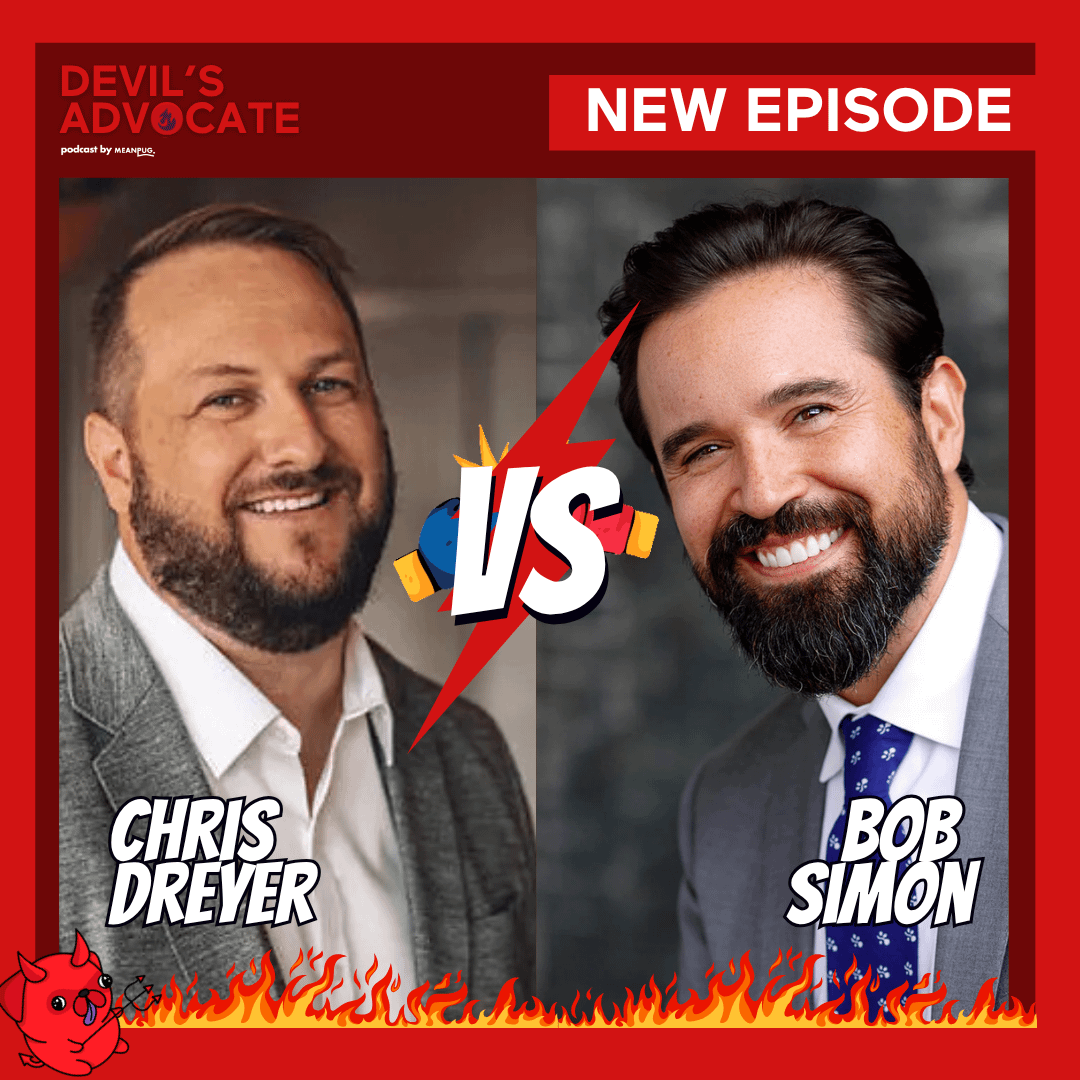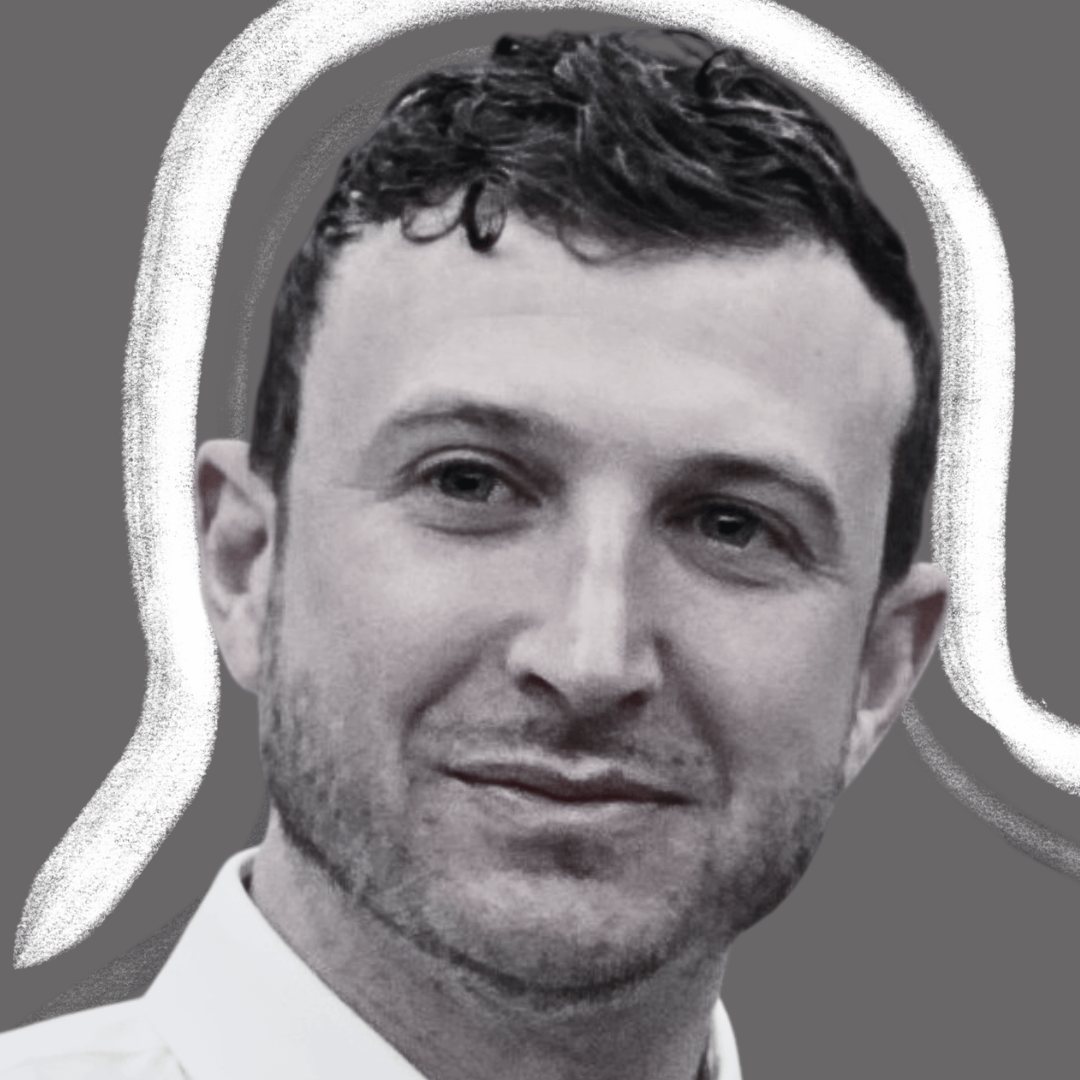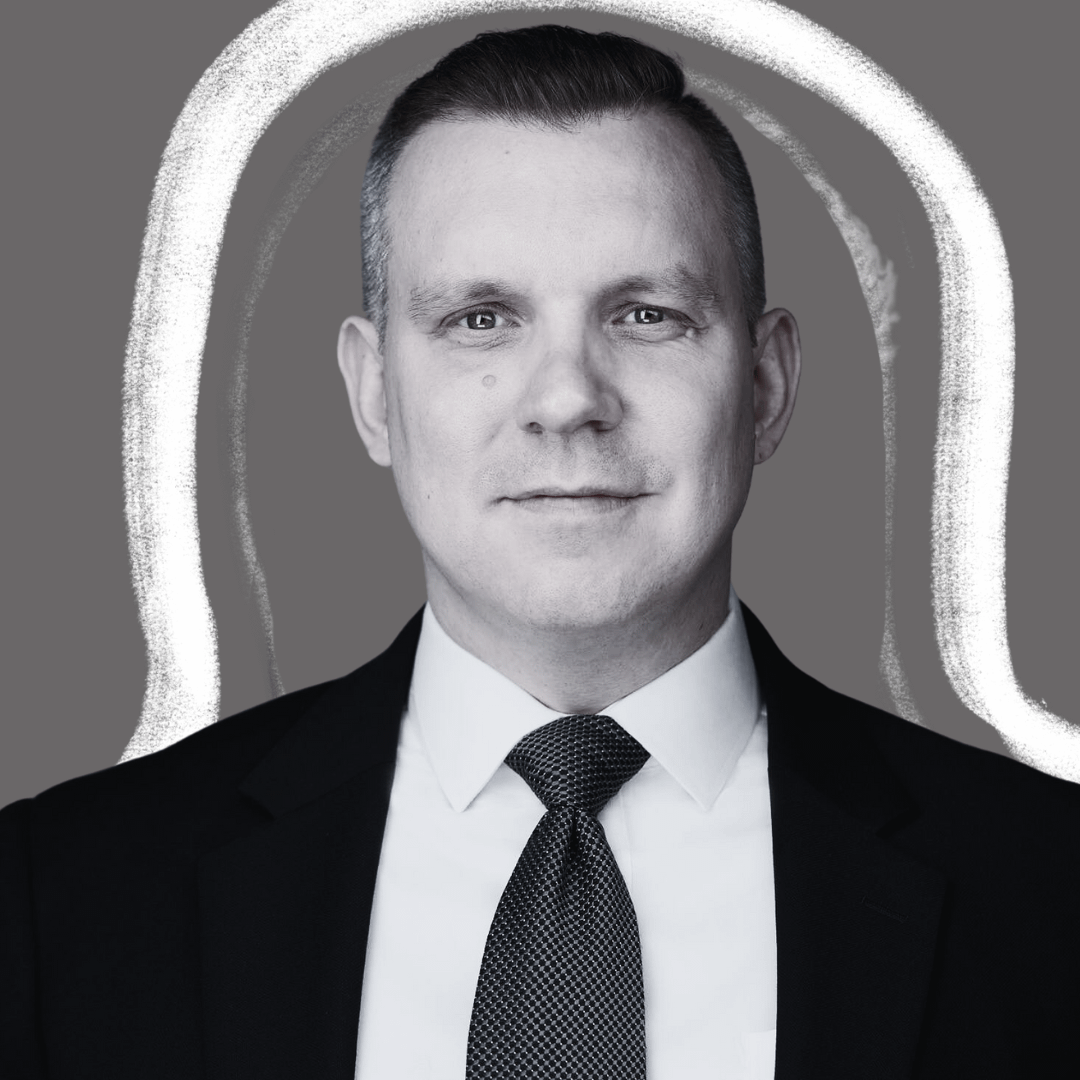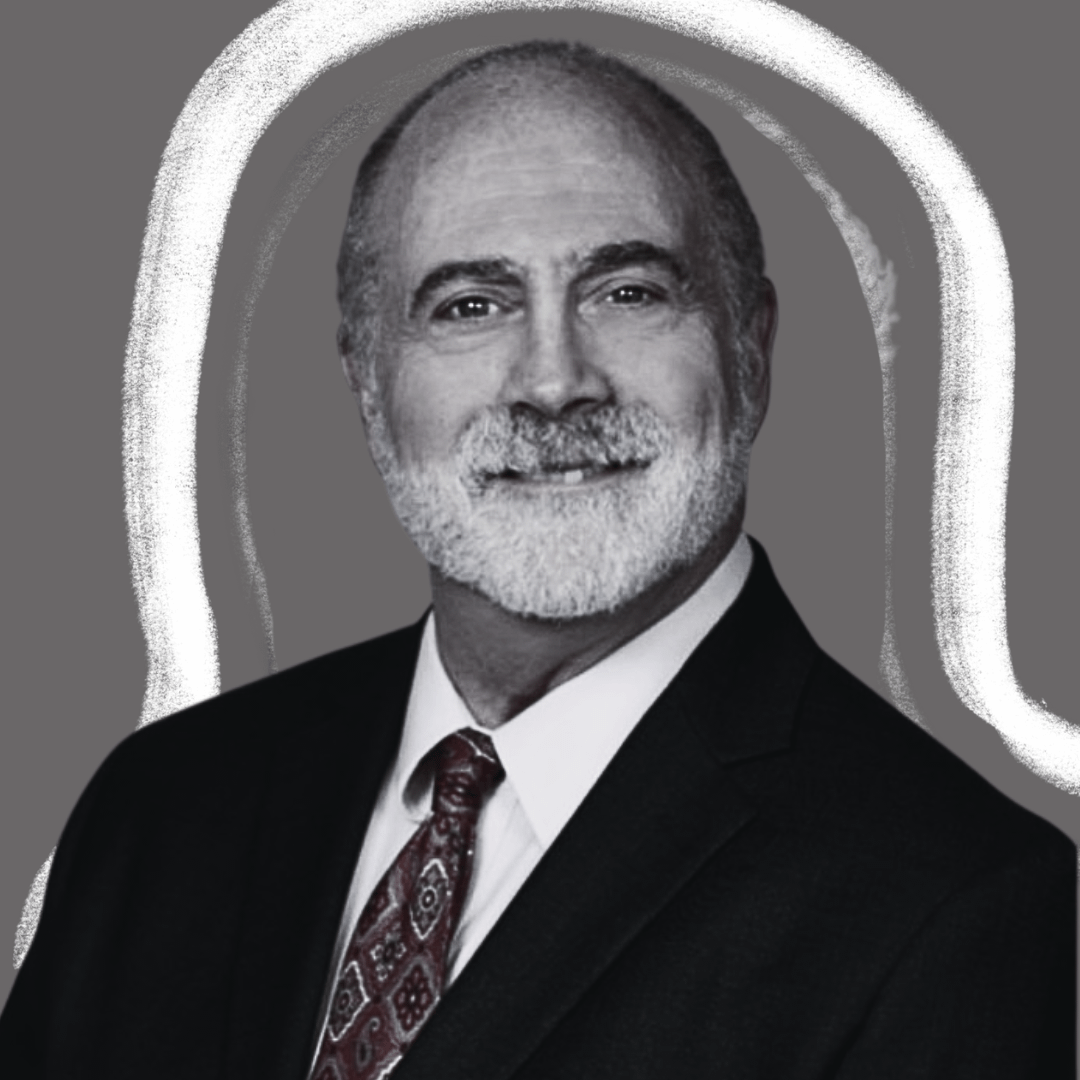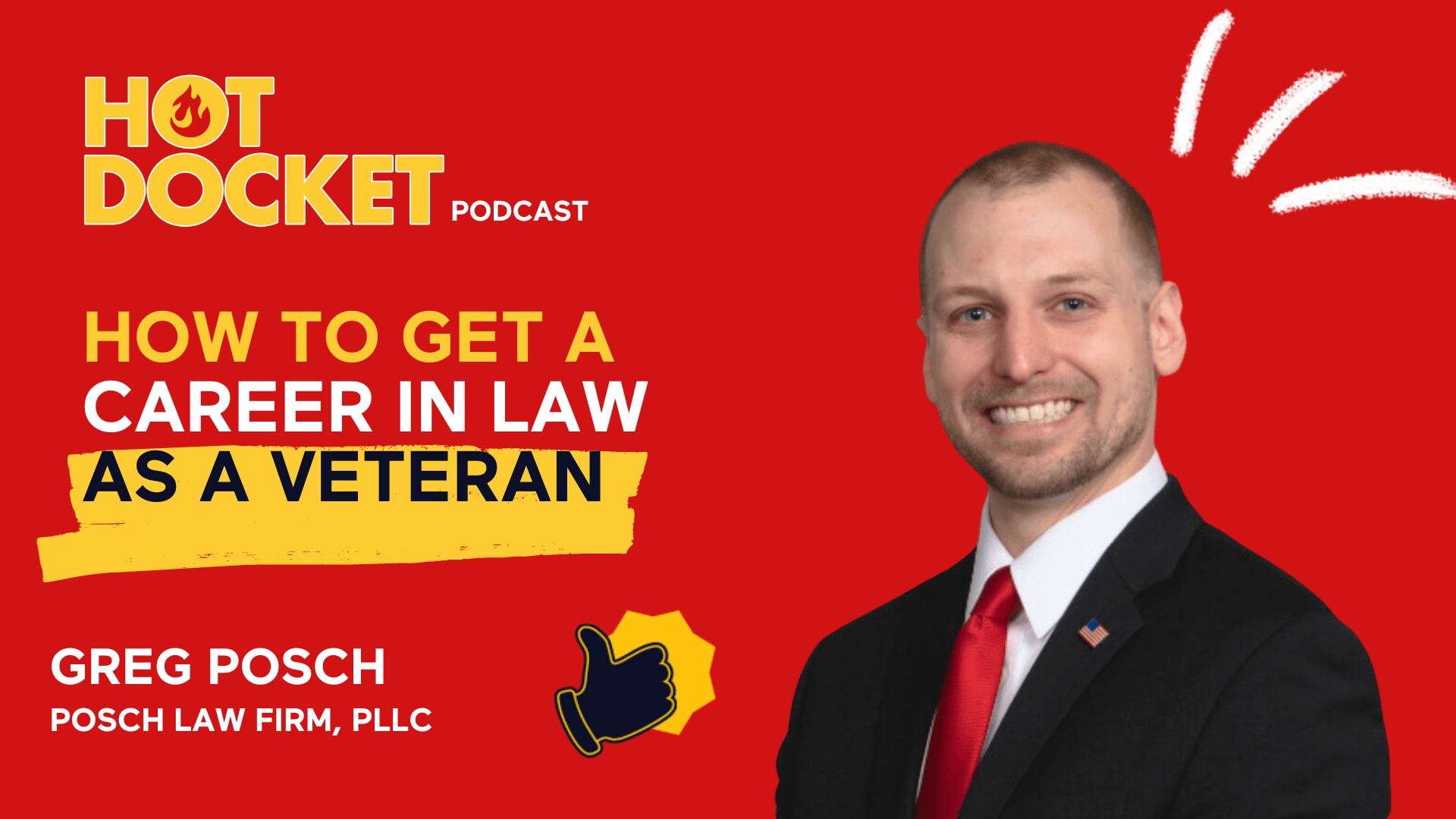
Episode Overview
What’s it like transitioning from the military to a civilian career in law? How can your military background help you succeed as an attorney? Today’s guest is here to give you the inside scoop, plus some valuable advice to veterans.
In this week’s Hot Docket, you’ll hear from Greg Posch, Owner and Attorney at Posch All, PLLC, in Raleigh, NC. Greg’s here to shed light on his journey from Air Force veteran to personal injury and estate planning attorney.
If you’re a veteran pursuing a career in law or just interested in the transition from military to civilian life, you’ll definitely want to tune in to this conversation!
Listen in to learn how your military background can give you a leg up in getting client referrals, infusing authenticity into your brand, winning in the courtroom, and much more.
Stay tuned for a game of “Rules of Engagement” where Bobby and Andrew give Greg a few legal marketing scenarios to see how he would respond.
Episode Links
Want to hear more from elite lawyers and industry-leading marketers?
Follow us on Social Media for more
Episode Topics
- Greg’s transition from Air Force veteran to lawyer.
- Expectations vs. Reality: Going from the military to the legal profession.
- Niching Down: Why Greg switched from a generalized law practice to a more specialty law practice.
- How he chose his two practice areas.
- Navigating contributory negligence as a personal injury lawyer in North Carolina.
- How does having a veteran background give you advantages in getting client referrals?
- Serving the military vs. serving the court system: Similarities and differences.
- Advice for veterans on preparing for civilian life and getting a career in law.
- Storytime: Bobby’s 1-day-long military career.
Key Actionable Takeaways for Veterans Interested in a Legal Career:
- Preparation and planning are crucial for veterans transitioning into civilian careers, especially in the legal profession. Don’t create your civilian plans too late. Greg started studying for the LSAT over a year before discharging from the military!
- When exiting the military and entering civilian life, maintain your momentum, consider timelines, and make sure you’re pursuing what you want in life, rather than what the military wants.
- If you’re not sure what practice areas should be your niche, try paying attention to supply and demand to see what areas could use your expertise.
- Your military background and network can pay off in the form of referrals, so keep your network strong!
Episode Transcript
[00:00:00] Greg Posch:
So the military and the, the civilian world with the legal world, they’re
very, very similar as in that if you know who to go to, you could potentially
get a lot done just because you’re talking to the correct person. If you
talk to the wrong person about things. You may just be spinning your wheels.
[00:00:24] Bobby Steinbach:
Welcome to Hot Docket, the show where we talk about winning marketing strategies
that have built the most successful
[00:00:28] Andrew Nasrinpay:
All. Join us every two weeks for the latest trends and tactics to grow
your law firm.
[00:00:36] Bobby Steinbach:
Hey everybody and welcome to the Hot Docket podcast. Today we have with us Greg
Posh, the owner of the Posh All.
[00:00:43] Bobby Steinbach:
And we’re going to be talking about veterans in the law, um, just
specifically making the jump from military into the legal profession. But I
think that concept of making a jump from one profession to legal is kind of
universal. It doesn’t have to be military to legal.
[00:00:56] Andrew Nasrinpay:
Yep. I think we’ve seen some examples too with police officers and other
types of, uh, professions that have a good career trajectory into legal.
[00:01:07] Bobby Steinbach:
Yeah. I feel like especially for like personal injury, kind of the. And the
interactions, the, the, the, the position we’re gonna have interactions
with everyday people and not with business owners, like white collar law or
whatever, blue shoe, black shoe, black shoe, whatever it is, I think if
it’s not that type of profession, it makes a lot of sense to make that
leap from like more of Profession like military, like police officer, um, where
you actually understand real world experience and talking to people
[00:01:38] Andrew Nasrinpay:
a little bit more relatable and you understand a lot of the folks that would be
your clients.
[00:01:44] Bobby Steinbach:
Yeah. I’m obviously having like a tenuous grasp on speaking today. So
I’m going to interview, or I’m going to introduce Greg here, Greg,
thanks for joining us. And hopefully you’re a better speaker today than I
am because my brain is just Obviously mush.
[00:02:04] Bobby Steinbach:
Greg, welcome.
[00:02:05] Greg Posch:
Thank you for having me.
[00:02:07] Bobby Steinbach:
Of course. So I’d love to hear from you just a little bit more about your
journey from Air Force veteran to lawyer.
[00:02:15] Greg Posch:
So I initially joined the Air Force in 2008, and I went through and enlisted
four year contract. I extended for 19 months. And during that timeframe, I was
an avionics technician.
[00:02:30] Greg Posch:
After that, I went to a safety specialist, which gave me a lot of, uh, OSHA air
force regulation experience at the same time I completed my bachelor’s.
two associates degrees through the Community College of the Air Force, and then
I transitioned to law school pretty much at the same time of my discharge.
[00:02:52] Greg Posch:
I think I was doing a, you know, an in processing at law school that I had to
take off one day to do an out processing on my final day in the military. So
everything on my end really flowed continuously.
[00:03:06] Andrew Nasrinpay:
So what was the hardest part of that transition and what was the easiest? Can
you give us a little more detail?
[00:03:11] Greg Posch:
I can. The hardest part of the transition was really being prepared to not have
the support in the military. When you are in the military, you have all of this
support that you could possibly need. You know, these bases, they have
everything. They have hospitals, they have libraries, they have car washes.
[00:03:27] Greg Posch:
They have anything and everything, and going into the civilian worlds, you know,
you have all of these things, but it’s not all in one place, and
it’s not necessarily free, which makes a difference. Um, and then you have
to go out to your community, the military, they put everything in a nice little
package for you.
[00:03:52] Greg Posch:
It’s nice, nicely wrapped and given to you. Uh, but you have to go out and
search for these things when you get into the civilian world, which reduces the
support on veterans and that can make life A little bit more difficult.
[00:04:07] Bobby Steinbach:
Yeah. And I feel like, you know, there’s a lot of preconceived notions.
I’m sure going into military life, like what were your, um, expectations
versus reality?
[00:04:17] Bobby Steinbach:
Getting into the military. I’m sure there was a Delta, right? Yes. Now
I’d love to talk about that same Delta for legal. Like what were your
expectations getting into legal? Did they match up to reality? And if not, what
were some of those differences?
[00:04:30] Greg Posch:
All my lawyers, I’ll put it this way. All my lawyers growing up were
essentially from a criminal aspects.
[00:04:37] Greg Posch:
So when I was growing up, I wasn’t necessarily, you know, the, you know,
straight and narrow. So I had a lot of, uh, uh, Attorneys that were in the
family that will, they weren’t in the family, but the lawyers were, are, I
had a family attorney, we’ll put it that way. So when growing up, it was
more so, you know, they charge us a lot of money and when there was trouble, but
they always got the job done and you only really worked with one lawyer.
[00:05:15] Greg Posch:
I feel like the landscapes kind of changed a little bit. Um, with that aspect.
So the realizations were, you know, I didn’t really have a preconceived
notion. I just knew that I wanted to get into a career field where I could help
people make a difference really, and potentially be able to make a decent
living.
[00:05:35] Bobby Steinbach:
Well, it sounded like your preconceived notion was lawyers are expensive.
Lawyers might, may or may not be competent, right? They might, might not really
be operating in the best interest of. of their clients. And that, for you at
least, isn’t turning out to be true in so far as you’ve built a
practice up where, you know, your contingency fee on the personal injury side,
I’m assuming, right?
[00:05:57] Greg Posch:
Yes. Yes.
[00:05:58] Bobby Steinbach:
So it’s not going to cost your client money unless they make a recovery.
And then can you tell us a little bit more about your other practice too? I know
that you’re one of those full service firms that have built up a practice
across multiple practice areas. So tell us a little bit more about the other
practices that you operate in, and especially if you could speak to, you know,
how you’re breaking some of those preconceived notions you had growing up
in those other practices.
[00:06:21] Greg Posch:
So the other, when I first started the firm, I, Pretty much took everything and
anything that I could that I felt I was competent to handle. I did criminal, uh,
there was bankruptcy, child custody, divorce, child support, anything on a civil
matter that I thought if I could handle competently or do the research in order
to learn it, uh, and watch court and really just go and use my knowledge to
apply it to a I would take.
[00:06:49] Greg Posch:
And one of the Preconceived notions that I, I, I tried to break was that you can
actually obtain good representation without having to worry about how
you’re going to pay your bills for the next month. If you go out there and
you look, you can find an attorney who’s willing to help you out and
wanting to help in any aspect that they can.
[00:07:13] Greg Posch:
And if you go to a smaller law firm, you can get a more affordable attorney. Um,
I have more so switched from a generalized to a more concentrated practice of
law with personal injury and estate planning. And I’ll probably getting
off, be getting off into workers compensation here probably I’d say within
about a year.
[00:07:36] Greg Posch:
Um, but breaking this code, Preconceived notions of, you know, I can’t
afford an attorney is just, that’s not, that’s one of the things
that I set out to help with is that you can’t afford an attorney. Now,
yes, you’re still going to have to pay the attorney and it’s still
probably going to cost a little bit of money, but it doesn’t mean you have
to really worry about, okay, well, am I going to make the mortgage?
[00:08:01] Greg Posch:
Am I going to make the car notes? Um, are we going to, you know, Be able to get
groceries or is that the attorney just going to take everything?
[00:08:09] Bobby Steinbach:
Yeah. Okay. That’s a great answer. And I, I want to go on a little bit of
a tangent here because you talked about personal injury and I know you’re
in North Carolina and you’re in one of those like notoriously bad States
for personal injury in the country.
[00:08:24] Bobby Steinbach:
Uh, what is it? I’m not pure contributory negligence. Um, so given that
you’re in one of those areas, I think we should take the opportunity to
just hear like, It sounds like everybody has their own approach to tackling that
problem of contributory negligence because it sounds like it’s like the
first thing that defense will bring up in a case.
[00:08:44] Bobby Steinbach:
What, what’s kind of been your approach to tackling that maybe from the
start?
[00:08:49] Greg Posch:
so you can’t be afraid to get in a little bit of a battle underneath the
last clear chance doctrine. That’s an, uh, a, uh, essentially an exception
to contributory negligence. So 1 percent at faults, The defendant falls into the
clear chance doctrine, which essentially says that the plaintiff put themselves
in harm.
[00:09:11] Greg Posch:
The defendant seen the plaintiff put themselves in harm. The defendant had the
means and availability ability to escape, uh, hurting the plaintiff and that
they did not take the means and the availability to escape hurting the plaintiff
and the plaintiff got hurt. That’s essentially it is. Then they are still
liable.
[00:09:29] Greg Posch:
So just because you’re contributory negligent doesn’t mean that
there’s, you know, that’s the end all say all that matter may have
to go in front of a jury and you have to prove those elements in a trial.
However, contributory negligence isn’t the end all say all in the matter.
And my approach would be specifically just trying to argue that whether it be a
insurance company you’re negotiating with, whether that be a third party,
uh, the person you potentially are suing, you have to let them know that and
show that, okay, contributory negligence is there.
[00:10:10] Greg Posch:
Excuse me. However, that’s not the law in itself. The law in itself does
have the last clear chance doctrine. And underneath, when you put both of those
doctrines together, essentially the contributory negligence and the last clear
chance, it starts to even out the playing field. So you can’t just be
tricked into thinking, okay, Well, that’s it.
[00:10:31] Greg Posch:
I’m 1 percent at fault. I’m barred from recovery. No, you just have
to be willing and ready to fight and put up that fight to prove that there was a
last clear chance for the defendant not to injure the plaintiff. If you see
those elements there.
[00:10:45] Andrew Nasrinpay:
Right. I have a, I have a question around when you decided to narrow From being
a more like general practice down to two practice areas.
[00:10:56] Andrew Nasrinpay:
How did you end up deciding on those two?
[00:10:58] Greg Posch:
So really it was just a supply and demand. I’ve been pretty fortunate to
be able to have a stream of referrals and, uh, through other attorneys, through
colleagues, through previous clients, through doctors who people get hurt. and
they get injured through a car crash or slip and fall, um, or, you know, a dog
bite or assault in a battery could happen in a bar setting, uh, from, you know,
employees on somebody who’s been drinking.
[00:11:31] Greg Posch:
And I’ve been fortunate enough to be able to see those cases and see the
value in the cases. So a lot of attorneys will turn down cases and they’ll
say, Oh, well, you know, it’s not, not high enough value. Well, That
really depends on the attorney and if you can look at the cases and look at the
facts behind the case and look at the injuries and you can still get people
relief and I think that in North Carolina, there is an issue with attorneys who
they may just be focusing on bigger cases when in all reality, you can build
your practice and you can continue to grow your practice on the cases that other
attorneys may think have no value and you can still get a, a, a better you can
still get relief for your clients in order to get them some justice because
those cases still have a value and depending on how willing you are to fight
over those cases will really, you know, help you grow.
[00:12:30] Greg Posch:
And that’s really been it for me. I’ve had Lucky enough, the
referrals and the eye to be able to see which cases I think can bring value to
my law firm. And a lot of that has been through personal injury, uh, while,
while focusing. Now, the estate planning is another area. And that was really
just educational and learning.
[00:12:51] Greg Posch:
But personal injury is probably the biggest bulk of, of my business.
[00:12:56] Andrew Nasrinpay:
So on that, does the veteran background give you a leg up in the referral game?
[00:13:03] Greg Posch:
Tremendously. Tremendously. So the military throws you into an environment where
you have to deal with different people. You have to deal with all types of
races.
[00:13:14] Greg Posch:
You have to deal with people who speak Spanish, people who speak, you know, you
may have a training linguist in, in your base. So you have to, you know, women
and men, and then you have families, you have your, your flight may get
together. So when you have. If you have a diverse military, like we do, and
you’re in that diverse military, like I was, then you’re forced to
interact with people, and you’re forced to be able to go out and try to
find a common ground.
[00:13:44] Greg Posch:
And it doesn’t have to be a massive amount of things. It can be, I’m
a father. It can be, I’m a mother. It can be, I like country music, right?
So if you can find that common ground with people, which the military will all
help you do, then you can go out and you can start to, uh, you know, network in
the career field.
[00:14:04] Greg Posch:
And you can start to, whatever career it is, you go talk to people and you try
to find their common interest, whether that be a chiropractor and disc bulge and
her disherniations and how they, you know, one can sit on top of each other, or
whether that be a, you know, cardiologist and how a Mediterranean diet helps the
heart.
[00:14:23] Greg Posch:
Um, or whether that’s an OSHA inspector and how, you know, the building
codes change, but they’re kind of grandfathered in. So if you have a steps
that aren’t even from a hundred year old building, you know, it could be
grandfathered in, not necessarily against the building code. So. I guess short
answer, long to short answer is yes, the military helps you communicate and bond
with people to a specific degree in order to allow you to excel in the legal
field or whatever area of interest.
[00:14:55] Greg Posch:
I
[00:14:55] Bobby Steinbach:
think you put that a lot better than I did at the start with the blue shoe,
white shoe, black shoe firm, whatever it is. Like, um, the point is that
somebody I’m not, not, not to like, Um, crap on people who go to Harvard
and then join like an elite law firm. I think that’s like great too. But
what was that person’s real world, real world, real world experience?
[00:15:17] Bobby Steinbach:
Why can’t I say that word? When was their experience, right? They
didn’t, were they interacting with people who shared very disparate, Types
of experiences from them. Or were they with people that were in the same boat as
they were kind of throughout their entire career and, uh, college, college life.
So I think you having that background puts you in a pretty distinct position,
like unique position.
[00:15:38] Greg Posch:
And, you know, and just to kind of add on to it as well, a little bit, you know,
people in the military, if someone’s in the military and they’re
watching this, you know, it’s nice to know that when, when, uh, You know,
things get bad, they can get bad for everybody in the military. So it’s
not only just a positive common ground, right?
[00:15:53] Greg Posch:
If you’re on 12 hour shifts and your flight’s on 12 hour shifts, or
you mess up in the military, and then there has to be a unit punishment, that
can be a common ground as well. And that’s life. When you start to go
through legal issues and you start to go through difficult times, a divorce is a
divorce.
[00:16:09] Greg Posch:
It doesn’t matter who you are. Child custody is child custody. It
doesn’t matter if you have a daughter or a son. If you’re going
through it, you’re going through it. If you have a neck injury, you have a
neck injury. So it, you know, outside of the positive, the military also helps
the members who go in see, you know, they can take the negative and turn it into
a positive.
[00:16:33] Greg Posch:
And then you can go and still, you know, try to make a lemonade out of lemons, I
guess you can say.
[00:16:41] Andrew Nasrinpay:
So, can you tell us some of the similarities and differences between your time
serving in the military? And now your time serving the community as an attorney.
[00:16:50] Greg Posch:
I can, I can. Um, I would say that it is, the, the government is essentially
structured very similarly, whether that’s the military or the court
system, right?
[00:17:03] Greg Posch:
Uh, typically the court is a nine to five open business hours. Um, however, in
the, Well, in the military, it can change a little bit because you have shifts
in the military. Day shift, swing shift, and night shift, right? Or mid shift, I
guess you could call it. And all the structures are really the same, you know.
[00:17:26] Greg Posch:
You have people in the government who are in charge of certain areas, like in
the court system, the clerk of the court is really the person who helps run the
court, the courthouse. In the military It’s broken up more in departments,
but if you find that specific person, you can get the answer or get, you know,
get any task accomplished.
[00:17:51] Greg Posch:
I’ll give you an example is that when I was in safety, you know, the
person we went to do to, to do the debriefs were typically the commanders,
whether that be a Lieutenant or whether that be a general or whether that be a
Colonel, you know, if you did a debrief, you went to that specific person. And
there would be times where.
[00:18:11] Greg Posch:
If you had to get something fixed, you may go to the manager in that unit and
you may not debrief the colonel. You know, it may be after the debriefing of the
colonel, but you would go to a specific person to get something done. So the
military and the, the civilian world with the legal world, they’re very,
very similar as in if you know who to go to, you can potentially get a lot done
just because you’re talking to the correct person.
[00:18:38] Greg Posch:
If you talk to the wrong person about things. You may just be spinning your
wheels. Um, so that and its time structure are are pretty similar As to the
opening times, right? So I mean there are like when I was at luke air force base
There was a a hospital but the hospital was only open from like eight to six
Well, that’s pretty much like the courthouse Nine to five so there’s
certain time structures and certain Authoritarian, authoritarian, uh, positions
that if you seek out, you can, you can handle business the way you accordingly
[00:19:19] Bobby Steinbach:
got to, got to pull the right levers, got to know his levers to pull.
[00:19:21] Greg Posch:
Correct. Correct. And that’s heavily, uh, you know, that’s heavily
in, in both worlds. And you know, I, I hate the saying, but a good attorney
knows the law, a great attorney knows the judge. I think that’s very
misconstrued. I really do. Um, because. Reputation goes with, uh, the legal
world. Um, however, Uh, you know, depending on the levers to pull, you can, you
know, accomplish more potentially.
[00:19:52] Greg Posch:
And the military does teach you how to do that.
[00:19:54] Bobby Steinbach:
We’ve talked a lot about, uh, the military and your journey from veteran
to lawyer in this episode. I, I think it’d be apt to kind of round out the
questions here with, uh, What’s some advice that you’d give to other
veterans who are considering making the move into a legal career?
[00:20:09] Greg Posch:
I would say, um, planning, preparation and planning. When I was going through
the process, I started studying for the LSAT, I would say about a year and a
half out before my discharge. I took the LSAT about a year before the discharge,
and I started putting in law school applications, probably, you know, You know,
six, seven months prior to my discharge, and I had everything timed.
[00:20:36] Greg Posch:
I knew exactly what schools would take me in January. I knew what schools that I
had to wait for upon my discharge, that what I could only get into in the fall
semester. I lined up my discharge to be cohesive with My application process and
my plans for the civilian life. A lot of military members, they start to put
their plans together, from what I’ve seen, too late.
[00:21:04] Greg Posch:
They start to, they get out and then you may have to wait. So you have dead
time, two, three months of just sitting around. You don’t want to do that.
You want to make sure that you discharge and you get right into the full swing
of things. One, you’re going to save money and you’re going to keep
yourself busy so you’re not burning through that cash.
[00:21:23] Greg Posch:
Two, it’s going to help with your purpose. Military members, they get out,
they lose their purpose. They lose their, you know, essentially they can lose
their career if they don’t have some, a career to go right into. And mind
you, if you’re an avionics technician working on F 16s, okay, and then you
start to go to be a janitor sweeping floors.
[00:21:43] Greg Posch:
There’s no comparison there really isn’t because the F 16 job is
just cool. So military members get into a, uh, a, I would say a position where
they can have kind of cool lives and they have a nice little paycheck coming in,
depending on your rank and the structures there. And if you go into the civilian
world and you have no structure to your life, you’re, you’re not
going to be in a.
[00:22:09] Greg Posch:
position for success. So you need to make sure that your plans align with your
timeline and that you can proceed as, as if you’re carrying purpose with
you from the military into the civilian world, according to what you want at
that time. Not necessarily what the military wants anymore, but what you want.
[00:22:30] Bobby Steinbach:
Yeah. Maintaining momentum. Yes. Considering timelines. I think those are Great
pieces of advice for anybody looking to make the move. So Greg, we’re
going to round out here. We always play a little game today. I thought
it’d be fun to create a game called the rules of engagement.
[00:22:51] Bobby Steinbach:
What we’re going to do here, let’s see how it goes. I’m going
to give you three scenarios, but we’re going to go back and forth, give
you three scenarios, and I want you to tell us. What you think an appropriate
response might be under our like quote unquote rules of engagement. Okay. So
yeah, let’s see how this goes.
[00:23:09] Bobby Steinbach:
So the first, the first scenario on Google search, someone’s running an ad
on your firm’s his name. This is called conquesting by the way. So you
search your name, you search, you know, posh law firm and uh, whoever, you know,
some guy in your market is running an ad. To appear before you on Google search.
[00:23:28] Bobby Steinbach:
What’s your response?
[00:23:29] Greg Posch:
Is a big pass offer.
[00:23:31] Bobby Steinbach:
Okay. Okay. Fair enough.
[00:23:33] Andrew Nasrinpay:
Okay. Uh, the second scenario is you put up a billboard on the highway and a
competitor puts up a billboard immediately before yours. And immediately after,
[00:23:44] Greg Posch:
uh, buyer beware
[00:23:46] Bobby Steinbach:
and maybe by the, maybe, maybe, uh, outbid the billboard before them.
[00:23:51] Greg Posch:
Yeah, you could. Yeah. Yeah. Sandwich him in. What I’ve seen is, you know,
when you have somebody who’s consistently pushing things in front of your
face as well. And if it’s, One if they’re over trying to essentially
step on toes like what’s what’s the reason that kind of gives you an
idea how they may play in the real world and that’s a double edged sword
if you’re in the client and They want and that attorney is biased as to
making their fee then you know buyer beware they could potentially sit there and
you know get you in the door and then just kind of treat you like a You know a
deli shop.
[00:24:27] Greg Posch:
You’re just another sandwich.
[00:24:29] Bobby Steinbach:
Okay, the last one here An intake, not a client. Puts up a bad review. If you
were on Google after you turned down the case, because for whatever reason,
[00:24:38] Greg Posch:
respond to your
[00:24:38] Bobby Steinbach:
response
[00:24:39] Greg Posch:
or respond ethically as best as you can. Uh, letting that, uh, you know,
potential client and other clients know that.
[00:24:49] Greg Posch:
You know, there’s a limited scope sometimes of what I think I can help
with and that we try to help people as best as we can. But in all reality, if I
don’t think I can provide the claim of relief for you or we have
disagreements, then that’s life. And sometimes it just helps to have
people go their separate ways.
[00:25:09] Greg Posch:
And that happens in the career field as opposed to, uh, you know, being stuck on
that matter. You just have to kind of know what you’re dealing with. Uh,
respond ethically and let them know. We I’m sorry it’s, didn’t
work out, but for whatever reason or another, I couldn’t take your case. I
wish you the best of luck.
[00:25:28] Bobby Steinbach:
All right. Beautiful. Thanks for playing rules of engagement, Greg, and thanks
for joining us today. It’s been, it’s been great getting to chat.
[00:25:33] Greg Posch:
Thank you for having me.
[00:25:41] Bobby Steinbach:
So military. Not, I, I have a funny story about me in the military and like, uh,
I’ll tell it in a second. But I think it was really interesting getting to
hear about, you know, that, that. The value that you could bring coming from a
real world experience, like the military, the diversity of, you know, viewpoint
and experience that it can, that can then transition into your everyday work.
[00:26:06] Andrew Nasrinpay:
Yep. I think one thing to bring up that maybe we didn’t talk about is just
having that background gives you a certain level of trust and authenticity that
may be hard on like a branding level. Yeah.
[00:26:28] Bobby Steinbach:
I’ll tell a quick, funny story about my military career. So I, I was like,
uh, considering doing ROTC going into college and I didn’t need the, I
didn’t end up doing like the scholarship program.
[00:26:43] Bobby Steinbach:
So I didn’t take money, which would have been a whole other story, but I
did anticipate doing it. I got, I was like, and all the email lists, I was.
Coordinating with I was part of like a student group. I was doing everything
that I needed to going into it. And, um, finally, like on the day, the first day
I was in Northeastern’s gym.
[00:27:04] Bobby Steinbach:
And in the gym there, there’s a lower level where there’s like a
basketball court and that’s where everyone was gathering for ROTC. And
there’s an upper level where there’s like treadmills and all these
other workout equipment type thing. I was running on the treadmill before ROTC.
I realized I was running too long and I was like late.
[00:27:21] Bobby Steinbach:
I went over to the balcony, looked down and saw a bunch of people running into
positions and getting yelled at. And I was basically like, Nope, not for me. I
immediately walked out of the gym and I never, I didn’t continue. So I had
about a, like a one day, a one day long military career there. It’s too
funny.
[00:27:40] Bobby Steinbach:
Yeah. It’s pretty bad. It’s pretty, uh, I would have been a
horrible. I would have been a horrible military member.
[00:27:46] Andrew Nasrinpay:
Why do you think that you don’t think you do well in a structured
environment?
[00:27:49] Bobby Steinbach:
I don’t think I do. I think I could, I’d be like great being able to
get up at a certain time, eat at a certain time.
[00:27:55] Bobby Steinbach:
Like I’m very structured in that way, but, um, needy, like being told to
do something just to do it. Like you just have to do this. Because I’m
higher rank than you, I wouldn’t be able to do that.
[00:28:07] Andrew Nasrinpay:
And same thing with the hurry up and wait where when you’re the military
and it’s like a top down approach and you’re, you’re managing
that many people.
[00:28:15] Andrew Nasrinpay:
There’s a lot of scenarios where you need things done quickly, but then
all the subordinates underneath are going to have to finish that task quick and
just wait. Because. The timeline to hit the next thing may take longer. So
there’s a lot of hurry up and wait, which I feel like might drive you
crazy too.
[00:28:34] Bobby Steinbach:
Yeah, that would drive me crazy.
[00:28:35] Andrew Nasrinpay:
But there’s a good reason for it. So it’s, I don’t know, it
cuts both ways.
[00:28:41] Bobby Steinbach:
Yeah. Yeah. Well, uh, in any case, that was, that was our show. Uh, I, I, I
gotta get a coffee. I’m going to get a coffee. Thanks for joining us on
Hot Docket Podcast. We’ll see you on the next one. We hope you’ve
enjoyed this episode of Hot Docket.
[00:28:55] Bobby Steinbach:
We’re your hosts, Bobby and Andrew, founders of Mean Pug, the marketing
agency for ambitious All.
[00:29:01] Andrew Nasrinpay:
Have questions about marketing or anything we covered today? Email us at bark At
CLARUS. com.





